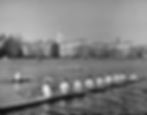Rowing at Harvard, 1941
- alanageday
- Aug 11, 2024
- 3 min read

John arose at five in the morning, slamming a hand on his alarm clock, slipping on his robe and slippers and sitting down at his desk. His roommate was used to this, and wrapped himself in his sheets as he rolled over, still asleep. John was excited, for today was Saturday, his favourite day of the week. There was no time to lose. He had to study math until ten, and he set his watch beside his books: two great columns of leather-bound tomes, their pages filled with formulas and figures. He was all set for four hours of math. His timetable was rather full; later he would be rowing crew along the Charles River. He would feel his muscles uncoil with the current, and the sharp air of winter on his cheeks. He could not wait. It was better to study before rowing, for he had no desire to do it after two hours on the water. John was proud of himself; he’d gotten into Harvard with the help of his uncle Frank, who had loaned him the handsome fees needed to enter such a prestigious establishment. He’d realised his dream. Ten thousand American dollars was a tidy sum. Uncle Frank was a self-made man, but he recognised the value of university education. For a college like Harvard, he hadn’t thought twice about helping his nephew out. That was why John was studying sciences and technology at Harvard. He wanted to join some great American enterprise like Ford or NASA. He was smart, and capable. Only the nation’s elite made it into Harvard. The selection process was tough; admissions were few, and the entrance exam was gruelling. John poured himself a large mug of coffee to help wake him up and concentrate on his math formulas.
Rowing was traditionally a British sport, but the Americans had taken to it quickly. The spirit of competition, the teamwork and the desire to surpass oneself were values dear to American hearts, especially at its great universities. Rowing crew was more prestigious than American football, for there was something old-fashioned and aristocratic about it – something quintessentially British that the Americans admired. John had developed fine manners since he started at Harvard. It was a way for him to integrate, to act as a model student, and to be just what the spirit of the university wished him to be. Ever since he’d donned the Harvard three-piece suit, he was a new man. What he enjoyed most about rowing crew was the races. He wanted to honour the Harvard crest stitched on his crew t-shirt. In this country the best rowers, the undefeated champions, were the Bulldogs of Yale. As soon as they arrived at a crew meet they began barking and roaring about their upcoming victory, in a most unsportsmanlike display. The Harvard team, the Crimsons, took themselves to be more dignified and mature. While the Bulldog supporters showed up with banners in their college colours, scarves and drums, the Crimsons’ supporters attended race meets in suit and tie, smoking their cigars. The Bulldogs and the Crimsons had been at war since their respective colleges were founded, but John was convinced that the Harvard Crimsons would win this year. He looked at this watch; it was ten o’clock – time to hurry out to training.
Alan Alfredo Geday
